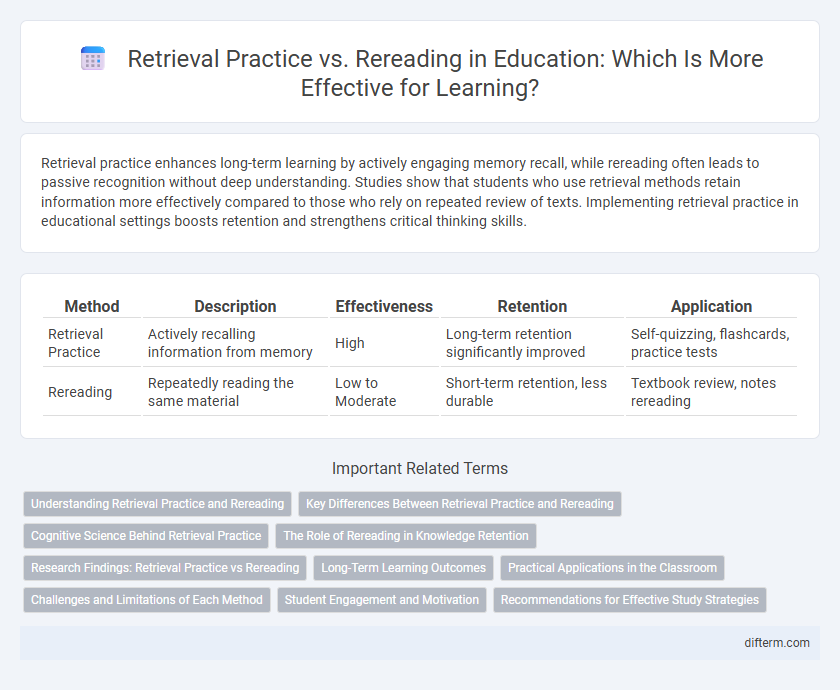Retrieval practice enhances long-term learning by actively engaging memory recall, while rereading often leads to passive recognition without deep understanding. Studies show that students who use retrieval methods retain information more effectively compared to those who rely on repeated review of texts. Implementing retrieval practice in educational settings boosts retention and strengthens critical thinking skills.
Table of Comparison
| Method | Description | Effectiveness | Retention | Application |
|---|---|---|---|---|
| Retrieval Practice | Actively recalling information from memory | High | Long-term retention significantly improved | Self-quizzing, flashcards, practice tests |
| Rereading | Repeatedly reading the same material | Low to Moderate | Short-term retention, less durable | Textbook review, notes rereading |
Understanding Retrieval Practice and Rereading
Retrieval practice enhances long-term memory retention by actively recalling information, while rereading primarily involves passive review with limited engagement. Studies show retrieval practice strengthens neural pathways, improving comprehension and application, whereas rereading often leads to familiarity without deep understanding. Implementing retrieval methods like quizzes or self-testing proves more effective than repetitive reading for mastery in educational settings.
Key Differences Between Retrieval Practice and Rereading
Retrieval practice actively engages memory by requiring students to recall information without prompts, enhancing long-term retention and understanding. Rereading involves passively reviewing text, often leading to superficial familiarity but limited deep learning. Research shows retrieval practice produces stronger retention and better transfer of knowledge compared to the repetitive exposure characteristic of rereading.
Cognitive Science Behind Retrieval Practice
Retrieval practice enhances long-term memory by actively engaging the brain's recall mechanisms, strengthening neural connections more effectively than passive rereading. Cognitive science research shows that the effort involved in retrieving information promotes deeper learning and better retention through the testing effect. Studies reveal that retrieval practice not only solidifies existing knowledge but also improves the transfer of information to new contexts, outperforming traditional rereading strategies.
The Role of Rereading in Knowledge Retention
Rereading enhances knowledge retention by reinforcing familiarity with the material and improving surface-level comprehension, particularly for complex or dense texts. While it offers short-term benefits in recognition and recall, its effectiveness diminishes without active engagement strategies. Combining rereading with retrieval practice maximizes long-term memory consolidation and deeper understanding.
Research Findings: Retrieval Practice vs Rereading
Research findings indicate that retrieval practice significantly enhances long-term retention and comprehension compared to rereading, which often leads to passive familiarity without deep understanding. Studies consistently show that actively recalling information strengthens memory traces and improves the ability to apply knowledge in different contexts. Meta-analyses of educational interventions reveal retrieval practice yields higher test performance and promotes durable learning, making it a more effective strategy than rereading for students at all levels.
Long-Term Learning Outcomes
Retrieval practice enhances long-term learning outcomes by strengthening memory consolidation and improving the ability to recall information over extended periods. Studies show that students who use retrieval practice outperform those who rely on rereading, retaining knowledge more effectively and applying it in varied contexts. Unlike rereading, which often leads to passive recognition, retrieval practice engages active recall processes critical for durable learning.
Practical Applications in the Classroom
Retrieval practice enhances long-term memory retention by encouraging students to actively recall information, making it more effective than passive rereading. Implementing frequent low-stakes quizzes and interactive questioning during lessons leverages this cognitive strategy to reinforce learning. Classroom environments that prioritize retrieval exercises see improved comprehension and student engagement compared to those relying primarily on rereading techniques.
Challenges and Limitations of Each Method
Retrieval practice faces challenges such as increased cognitive load and potential learner frustration when incorrect recall occurs frequently, which may hinder motivation. Rereading is limited by passive engagement, often leading to shallow processing and poor long-term retention despite its simplicity and low effort. Effective educational strategies should balance retrieval practice's active reinforcement with rereading's familiarity to optimize learning outcomes.
Student Engagement and Motivation
Retrieval practice significantly boosts student engagement and motivation by actively involving learners in the recall process, which strengthens memory retention and confidence. In contrast, rereading often leads to passive learning, reducing enthusiasm and diminishing the likelihood of long-term knowledge retention. Research indicates that strategies promoting active retrieval transform study sessions into dynamic experiences, fostering deeper cognitive engagement and sustained academic motivation.
Recommendations for Effective Study Strategies
Retrieval practice enhances long-term memory by actively engaging students in recalling information, making it more effective than passive rereading. Implementing spaced retrieval sessions and self-testing can improve knowledge retention and transfer. Educators should encourage frequent low-stakes quizzes and generation of practice questions to maximize study efficiency.
retrieval practice vs rereading Infographic

 difterm.com
difterm.com